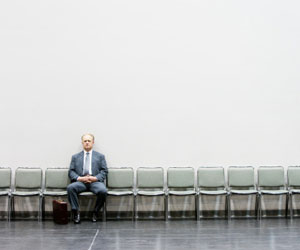Why Many Workers are Playing It Safe — Unhappily
 The US economic recovery remains on a slow trajectory, as evidenced by the latest Commerce Department report. Due in part to a brutal winter throughout the country, growth in the first quarter of this year practically stopped. And while employers are hiring aggressively after the winter cold snap, the Labor Department says job growth still lags behind the millions of people just now entering the workforce or looking to get off unemployment rolls.
The US economic recovery remains on a slow trajectory, as evidenced by the latest Commerce Department report. Due in part to a brutal winter throughout the country, growth in the first quarter of this year practically stopped. And while employers are hiring aggressively after the winter cold snap, the Labor Department says job growth still lags behind the millions of people just now entering the workforce or looking to get off unemployment rolls.
The shaky economy and rocky job market have left many people underemployed—working in part-time jobs or occupations that are simply far below their capabilities and credentials. And that may stem in part from a reluctance to leave a tiresome-but-stable position for the uncertainty of a job that may pay better—but may not work out.
A team of researchers at University of Wisconsin-Milwaukee recently found that economic pessimism has left many dispirited workers feeling risk-averse and languishing in the dreary safety of lousy-paying, ungratifying jobs.
Led by vocational psychologist Nadya Fouad, the research team surveyed 179 individuals working either full-time or part-time. The participants provided basic demographic information, including their education and income levels. Most of them had at least a bachelor’s degree. They were also invited to identify their social class.
The participants filled out questionnaires designed to assess their spending habits, perceptions of economic conditions, satisfaction with their lives and their jobs, their willingness to take work-related risks, and their plans to stay or leave their current positions.
Most of the participants reported feeling content with their jobs and committed to their employers, but were neutral about taking vocational risks and somewhat pessimistic about economic conditions.
But those who identified themselves as working poor showed a lower sense of well-being and the least amount of confidence in the economy. And they also reported a greater reluctance to take work-related risks, such as asking for a raise or seeking a new job.
In a follow-up experiment, Fouad and her colleagues surveyed 82 working adults, most with a college education. More than 60 percent of those individuals identified themselves as upper middle class, and most of the remaining participants identified as lower middle class or working class.
This time, the researchers asked the participants to rate their likelihood of staying in or changing jobs once the economy fully recovered. Again, they found that people who identified as working class were more risk-averse compared with the other participants.
The findings are detailed in the Journal of Career Assessment. The researchers say future studies should focus on a larger, more diverse sample of people.
The study results could reflect a significant contributing factor to sluggish employment growth. Low turnover rates keep jobs from opening up, perpetuating unemployment rates.
Reference
Fouad, N.A., Liu, J.P, Cotter, E.W., Gray-Schmiedlin, I. (2014). Impact of Economic Perceptions on Work-Related Decisions. Journal of Career Assessment, 22(2), 355–370.




APS regularly opens certain online articles for discussion on our website. Effective February 2021, you must be a logged-in APS member to post comments. By posting a comment, you agree to our Community Guidelines and the display of your profile information, including your name and affiliation. Any opinions, findings, conclusions, or recommendations present in article comments are those of the writers and do not necessarily reflect the views of APS or the article’s author. For more information, please see our Community Guidelines.
Please login with your APS account to comment.